
Recent estimates state up to one in five Australians earn money through the share economy. That’s a huge number of us who drive for a ride sharing service, (eg. Uber) rent out a spare room (eg. AirBnB), deliver food, (eg. Menulog), complete odd jobs (eg. Airtasker) or even provide professional services (eg. Upwork).
What is the sharing economy?
The sharing economy is an online marketplace where people offer services for money and use contractors to provide those services. These services are provided via websites and apps. The most well known sharing economy businesses, as above, are Uber, Airtasker, AirBnB and Menulog, but there are a great deal more out there, offering everything from business services to tool sharing, car parking to pet care.
Tax in the share economy
The ATO treat income from the sharing economy exactly like any other income. So, just like you wages or salary from any other job or business, money earned through the share economy is considered assessible income for tax purposes. The total amount you earn from both salary and wages work PLUS share economy work determines how much you are taxed, according to the tax rate applicable to your combined income.
Example #1
Consider the example of Cal. He works at a bottle shop and earns $23,000 per year. He also drives part time for Uber and makes an additional $6,600 per year ($600 of which would cover his GST obligations). To work out his total tax obligation for the year Cal would need to add the $23,000 and the $6,000 together. From this he would calculate his tax obligations on the combined $29,000.
Save a large chunk of your share economy income up front!
We suggest you save at least 30% of any sharing economy income to cover your tax obligations at tax time. Any share economy income is considered taxable by the ATO. However, unlike a salary job where you pay tax each week, in the share economy you don’t pay tax on the income until tax time.
We commonly see clients who are in similar situations to Cal (see example #1). The average Australian tax rate is about 25-30%. Therefore, at tax time Cal would be required to make a payment of about $1,500 to cover his tax obligations for his Uber income.
So don’t get caught out with a big tax bill at tax time. Ensure you’re saving some of your share economy income each week!
Specific examples of sharing economy income
If you are a driver for Uber, Uber Eats, Menulog or a similar company that connects customers and suppliers for services (e.g. ride sharing or food delivery), then the income you earn as delivery fees is assessable income. The amount you include is the amount that you receive in payment from the company, after they take their fee.
If you are an Airbnb host, rent your property on Stayz or lend your car in a car-sharing scheme in exchange for money, then that income is also assessable for tax purposes. The same rules apply to niche platforms that allow users to rent out their caravans or boats.
Don’t try and hide your Share economy income
The ATO and Government have put in place rules that require all marketplaces operating in Australia to share their user data in order to maintain the fairness of the tax system.
This means the ATO can verify that users of these platforms are declaring the right amount of income by using sophisticated data-matching techniques.
The good news about share economy tax
Tax deductions may be available to you depending on type of share economy income you earn.
Example #2
Take Kate as an example. She has a part-time supermarket job, but also works in the sharing economy to earn some extra money. Kate takes tutoring jobs she finds on Airtasker and delivers food for Uber Eats. She owns her own car and uses her mobile phone to find the jobs and navigate when she is delivering.
Claire must include all the income she earns from her supermarket job, as well as from the tutoring and food delivery, on her tax return. But she can also claim deductions for certain car and mobile phone expenses, and the supplies she buys for tutoring.
So if her mobile phone plan costs $80 per month (or $960 a year) and 40% of her phone use is related to her share economy income earning then she can claim $384 (40%) of her total yearly phone bill as a deduction on her return.
And, she tracks a total of 3671 km traveled delivering Uber Eats which she can claim at 68c per km. She can claim $0.68 x 3671km = $2496 as a deduction on her return.
Record keeping
Whether it is related to income or deductions, keeping good records is essential when earning money through the sharing economy. A digital backup copy on a spreadsheet or Google Doc is advisable, as the ATO can ask you to produce records to prove expenses were actually incurred or that income was earned.
We can help
At Etax we have many in-house accountants who are experts on the share economy. If you need help getting registered for GST or an ABN before you start, or you need help with your tax obligations get in touch with us on [email protected] and we’ll be happy to help!




